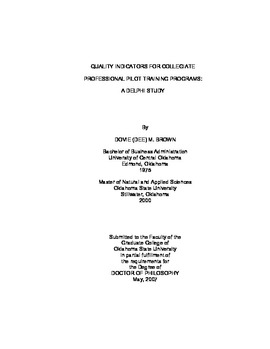| dc.contributor.advisor | Ausburn, Lynna J. | |
| dc.contributor.author | Brown, Dovie (Dee) M | |
| dc.date.accessioned | 2013-11-26T08:34:14Z | |
| dc.date.available | 2013-11-26T08:34:14Z | |
| dc.date.issued | 2007-05 | |
| dc.identifier.uri | https://hdl.handle.net/11244/7325 | |
| dc.description.abstract | Scope and Method of Study: The purpose of this study was to identify the quality indicators that comprise an exceptional collegiate professional pilot program as identified by a national panel of experts in aviation higher education. A Delphi panel of 13 experts participated in a 3-round Delphi to identify quality indicators in 9 categories. This was accomplished through generation of qualitative comments in the first Delphi round, following by rating and ranking of categories and items within categories in 2 subsequent rounds. | |
| dc.description.abstract | Findings and Conclusions: The Delphi panel of experts provided their perceptions of quality indicators within 9 categories and were in clear agreement concerning the relative importance of categories and items within categories. The categories in descending order of importance were: Faculty; Equipment and Technology; Curriculum and Instructional Delivery; Government (FAA) Compliance; Facilities; Assessment/Evaluation; Flight/Administrative/Staff Support Services; Completion Rates; and Student Organizations. Analyses of panelists' overall comments were based on SRank scores, mean ratings for importance, and tier analysis. In the top-rated category, the issue of faculty pay was identified as the most important quality indicator for collegiate flight training programs. Other important issues included the need for programs to utilize technologically advanced aircraft (TAA) and/or flight simulators for flight training; use of real-world scenarios or activity-based learning; fully comply with FAA regulations; provide adequate space for all types of training and maintenance; formally assess higher order thinking and learning skills; provide administrative support staff; monitor completion rates; and involve faculty and students in various collegiate aviation organizations. Overall, panelists identified quality indicators that represented best practices but did not provide benchmarks for measuring program quality. The findings of this study could be used as a starting point from which to further identify benchmarks for determining flight training program quality. | |
| dc.format | application/pdf | |
| dc.language | en_US | |
| dc.rights | Copyright is held by the author who has granted the Oklahoma State University Library the non-exclusive right to share this material in its institutional repository. Contact Digital Library Services at lib-dls@okstate.edu or 405-744-9161 for the permission policy on the use, reproduction or distribution of this material. | |
| dc.title | Quality indicators for collegiate professional pilot training programs: A Delphi study | |
| dc.contributor.committeeMember | Self, Mary J. | |
| dc.contributor.committeeMember | Kutz, Mary N. | |
| dc.contributor.committeeMember | Davis, Charles Robert | |
| osu.filename | Brown_okstate_0664D_2219.pdf | |
| osu.accesstype | Open Access | |
| dc.type.genre | Dissertation | |
| dc.type.material | Text | |
| thesis.degree.discipline | Occupational Education Studies | |
| thesis.degree.grantor | Oklahoma State University | |
